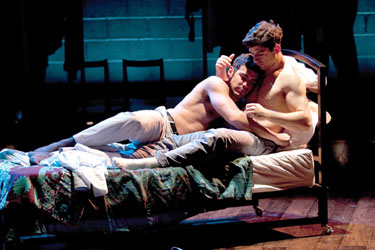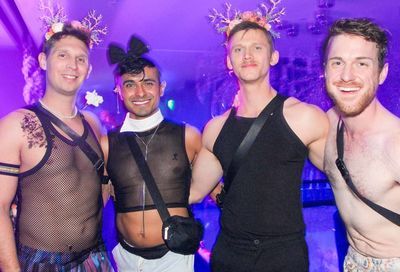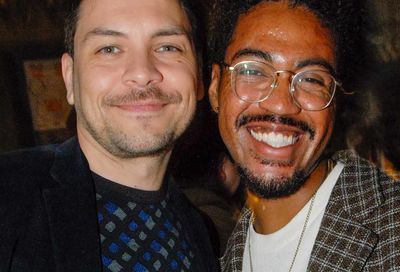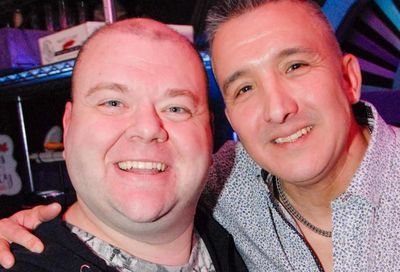Storytellers
Sycamore Trees is an overly crowded, sometimes needlessly eclectic show that allows too much to wander out of focus
In the opening moments of Ricky Ian Gordon’s musical Sycamore Trees, now premiering as part of Signature Theatre’s ”American Musical Voices Project,” lead character Andrew’s (Tony Yazbeck) pronouncement that he has a story to tell is met by protest from the other characters assembled on stage.
”We all,” they insist, ”have a story to tell.”

Snuggling through Sycamore: Risch and Yazbeck
(Photo by Scott Suchman)
And this is part of the problem with Gordon’s musical portrayal of his family’s story over the past six decades. (The reason behind his decision to change the names of the members of his family isn’t entirely clear but better just to go with it.) Each and every one of them – from his parents to his sister to the partner he loses to AIDS – has a story to tell. Gordon, unfortunately, tries to tell all of them in an overly crowded, sometimes needlessly eclectic show that allows too much to wander out of focus. We only see the dense forest, not the trees.
Working in its favor, however, is the fact that Gordon’s family has, in fact, so many compelling stories to tell. Stories that have been told to greater and lesser degrees in other shapes and forms, but not with such clear-eyed honesty. There is an unvarnished truth at work here, a sense of desperation in how thoroughly Gordon wants to lay the history out.
But where he begins the process with intimate knowledge of the disparate figures that occupy his life, we do not. We are relying entirely on him.
Sycamore Trees opens, after some confusion and consternation, in the 1940s when ”Borscht Belt” singer/comedienne Edie (Diane Sutherland) meets Sydney (Marc Kudisch). They dance, fall in love, get pregnant, get married (in that order) and start down the road of building a family. A family they decide to raise in one of the brand-new, suburban communities that was an icon of good living in the 1950s. New appliances in the kitchen, a beach club for the kids and streets lined with sycamore trees.
Things tumble quickly as Edie and Sydney’s four kids begin to grow up. Myrna (Jessica Molaskey), the oldest, is a writer who wants desperately to get out of Long Island and do something more than have kids and make dinner. Theresa (Judy Kuhn) wants to rail against segregation and poverty and injustice. Ginnie (Farah Alvin) is the youngest, the good girl of the family. Her father’s favorite. Ginnie would like to be anything else.
Andrew, on the other hand, often feels like his father’s greatest disappointment. A kid whose friends are all girls and who is outed by an older boy who convinces him to ”put his mouth on it” and then tells Andrew’s secret to anyone with ”fists or an epithet.” A secret 12-year-old Andrew doesn’t even really yet understand.
Sycamore Trees then unfolds into the kind of cross-decade family story with which we’ve largely become familiar, marked with the guideposts we’ve come to anticipate. The divide of the Vietnam War, the romanticism of Swinging London, the rise of the drug culture, the dawn of the Sexual Revolution, and the horrifying sexual wake-up call that was AIDS.
Even as Sycamore Trees starts to lose its way, as the frantic desire to tell it all ends up forcing the show to explore less and less, there is great heart to what Gordon is attempting to do. While the songbook is a somewhat roughly crafted collection in terms of an overall sense of theme and narrative, there are some absolutely beautiful threads and lovely compositions.
”Ours,” a duet performed by the freshly in love Sydney and Edie, sounds like something from the radio stage of a 1940s big band. Sentimental and just a touch naïve, it brings both the flavor of the time and the hopes of the characters brightly to life.
Myrna’s ”I Don’t Know What to Write/I’ll Get Clean” is another showstopper, delivered with great physicality by Molaskey. Myrna’s tragic descent into helpless addiction is rendered with a sharp acidity and accented with a gnawing pang of regret.


 AND ONE HALF STARS
AND ONE HALF STARSTo June 13
Signature Theatre
4200 Campbell Ave.
Arlington
$52-$76
703-573-7328
signature-theatre.org
There are other successes, including the darkly humorous ”Self Help” and the stirring ”Watercolor.” ”My Mother is a Singer” has some evocative moments, as does ”Father’s Song” and the show’s title song ”Sycamore Trees.” And director Tina Landau has gathered together a strong cast to deliver Gordon’s music. Yazbeck has a beautiful quality to his voice, pitch perfect for the awkward longing of his character. The desire to please while still preparing to flinch away from a punch or cruel remark. He’s well joined by Kudisch as the clan’s brooding, blue-collar patriarch whose imposing physical presence is a shocking contrast to the glasslike tones his voice is capable of bringing forth.
Sutherland’s voice is called out from another era, a high, Golden Age of Hollywood vibrato that is wonderfully matched to solos, though it does pull away from some of the ensemble’s group work.
But, even at its brightest, Sycamore Trees is still weighted down with too many competing narratives, too many directions we’re asked to travel. What Gordon (and Nina Mankin, his co-writer for the book) attempt to tell in the boundaries of a single musical instead begs to be many shows, each given their own time and attention and space to grow and develop.
Each of his characters truly does have their own story to tell. What Gordon failed to do, however, was ask each one to please wait their turn.
Support Metro Weekly’s Journalism
These are challenging times for news organizations. And yet it’s crucial we stay active and provide vital resources and information to both our local readers and the world. So won’t you please take a moment and consider supporting Metro Weekly with a membership? For as little as $5 a month, you can help ensure Metro Weekly magazine and MetroWeekly.com remain free, viable resources as we provide the best, most diverse, culturally-resonant LGBTQ coverage in both the D.C. region and around the world. Memberships come with exclusive perks and discounts, your own personal digital delivery of each week’s magazine (and an archive), access to our Member's Lounge when it launches this fall, and exclusive members-only items like Metro Weekly Membership Mugs and Tote Bags! Check out all our membership levels here and please join us today!























